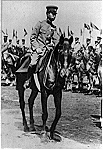Posted on September 17, 2001
Don't Believe The Hype
The enemy's resolve is overstated
by
Daniel Clark
There's a tragic prejudice which tends to accompany America's international conflicts, one that lends aid and encouragement to the enemy, while threatening the rights of ethnic minorities in the United States.

The most obvious example of this was seen during the Second World War, when FDR had Americans of Japanese, German and Italian origin rounded up into internment camps, as "enemy aliens." Among these three groups, the Japanese were imprisoned in the greatest numbers by far. This is just as one would expect, since it was Japan whose attack forced America to enter the war.
These "enemy aliens" were actually mostly U.S. citizens, and, up until that point, mostly loyal and patriotic. Nevertheless, their constitutional rights to liberty and property were stripped away by public hysteria, and by political leaders who blithely chalked up the Constitution as just another casualty of war.
The shame that resulted from those decisions will prevent the federal government from taking any similar actions against any ethnic group in the foreseeable future, but this restraint does not necessarily extend to American society as a whole. Throughout the Iranian hostage crisis and the Gulf War, there was no shortage of incidents in which Arab-Americans were harassed, threatened and assaulted. In the aftermath of the terrorist attacks on New York and Washington, we can expect to see a spate of such reports in the upcoming months.
It's perfectly simple to condemn some lardhead who physically confronts a stranger because of his accent or the color of his skin. Few seem to object, however, to this same prejudice when it manifests itself in misperceptions of our overseas enemies, which likewise portray those of another nationality as if they were something other than human.
Whereas Japanese immigrants were treated in the U.S. as subhuman, the Japanese soldiers and sailors were given credit by many for being, in a way, superhuman. Their religious devotion to Emperor Hirohito was supposed to have made them superior fighters, the kind that would never stop fighting until the death of the very last man. Evident of this were the kamikaze pilots, who were not only willing, but eager, to die in order to further the Japanese war effort.

A funny thing happened on the way to the last man standing in Japan. At the urging of two American bombs, the Japanese Empire surrendered unconditionally, agreeing in the process to disband its entire military apparatus. Hirohito, reduced to a virtually powerless figurehead, had to admit to the Japanese people that he wasn't actually God. It seems our fire-breathing, super-warrior enemies had ordinary human frailties after all.
Our conflicts with various Islamic governments have followed this same pattern, most memorably the Gulf War. Many of the "expert" analyses during the prelude to that war were especially noxious. Until the fighting actually began, it was frequently moaned that the seasoned Iraqi warriors would prove to be too much for our freckle-faced American kids, who had no business being armed with anything more harmful than a frisbee.
Like the Japanese in WWII, the Iraqis were supposed to have been superior fighting machines, with a level of dedication far above anything that mere Americans could muster. Indeed, the American troops were said to have been conflicted about the legitimacy of their mission. Moreover, it was often wondered aloud whether they had confidence in their country and its elected leaders, having grown up in the post-Vietnam, post-Watergate era.
The obvious superiority of America's generals and the weaponry at their disposal was widely disregarded. So was the mighty Iraqi army's recent eight-year war with Iran, which ended in a fruitless stalemate.
After a month of effective saturation bombing, the ground war began, and it didn't last long, as Saddam Hussein's larger-than-life professional fighting men were routed. One could just picture the American pessimists in their living rooms, sitting in slack-jawed amazement that our boys hadn't simply dropped their weapons and fled at the sight of those bloodthirsty warriors.
Those Iraqis, whom we were told would never surrender under any circumstances, found themselves not only beaten, but also ill-supplied, and suffering the ravages of thirst. Many of them surrendered to anybody who could offer them bottles of water. Quite a few gave themselves up to unarmed camera crews for that reason.
There had been nothing about Iraq's military past that suggested that they stood any chance of winning the war. What belief there was in their formidability was based almost solely on the fact that they were Muslims, and that they believed they were fighting a Holy War. So what? It's perfectly normal for anybody, of any religion, to believe that God is on his side when he goes off to battle. This doesn't make any soldier impervious to bullets, or to the realization that his side has been defeated.
It's not as if Islam were entirely foreign to the United States. There are plenty of Muslims living in this country, and thousands of them serve in the armed forces. If these people were the ultra-proficient war monsters they are presumed to be when fighting for another country, we would have them organized into specialized Islamic commando squads, but we don't. They serve right alongside our other soldiers, and they blend in.

There's no question that the prejudicial fears that emanated from the American media gave aid and comfort to the enemy, because Saddam played them for all they were worth. At one point during the conflict, he even warned that American pilots would be shot down and eaten. He must have known at that time what much of the world wouldn't figure out until the war was over: that the caricature that had been drawn of the Iraqis was stronger than the Iraqis were themselves.
Once the shock and horror of the events of September 11th start to recede into the background, and Americans begin bracing themselves for a full-blown war, we're sure to hear many of the same pessimistic projections repeated. Like the kamikaze pilots, the terrorists who carried out the recent attacks flew willingly to their deaths. This is bound to trigger familiar warnings that we are dealing with an enemy that is not afraid to die.
If that were true, it would work out just fine. As General Patton told his troops, an American soldier's duty is not to die for his country, but to make his enemies die for theirs. If Osama bin Laden's men are willing to die, then ours will be happy to help them.
It's a mistake, however, to believe that nearly everyone in bin Laden's organization is ready to welcome death. If that were so, they would assemble an army, declare war, and stand up and fight. Instead, whenever one of the terrorists strikes, his companions run away.
We're told that terrorist suicide missions are ingrained in these people by their religion, that they believe they will be rewarded in the afterlife for sacrificing themselves in the process of striking a blow against the Great Satan, America. This deeply held religious belief does not seem to have spread to the top of the Islamic terrorists' flow chart, however. Why is Osama bin Laden constantly hiding, eluding confrontation by escaping from one bunker to another? What made Saddam so scarce at the end of the Gulf War, when our intelligence became convinced that he had employed several men to serve as decoys, and possibly be captured or killed in his place? Why did Moammar Khadafy suddenly fade into irrelevance after President Reagan perforated his "line of death" with a swarm of F-111s? Why don't these men stick around and fight to the death? Don't they want to go to heaven too?
It's unthinkable that the United States could ever launch an unprovoked attack against a defenseless civilian population, as was done at the World Trade Center, but this isn't because we don't have any individual men who would be willing to carry out such an attack. Who doubts that, out of our population of about 280 million, we could find a couple dozen misfits and losers who would be willing to commit suicide in the process of killing thousands of others, guided by a belief that it was the only way to give their own lives significance? The reason it would never happen is that the United States is a moral nation, founded on respect for individual human rights. It's not because there is some genetic distinction between Americans and Arabs that precludes the one from repeating the acts of the other.
There's a tendency in our pop culture to promote the idea that doing evil makes people stronger than is humanly natural. In films like Fatal Attraction and the over-the-top remake of Cape Fear, the villains withstand injuries that would have killed an ordinary person many times over. In the real world, things just aren't that way. People who commit evil acts are made of flesh and bone just like anyone else. It will not take kryptonite to kill Osama bin Laden; a single, well placed bullet, grenade or missile will do the trick.
When our enemies are romanticized, it serves to rationalize the type of hostility that Arab-Americans are no doubt experiencing right now. If we were to accept the premise that terrorists commit atrocious acts because their religion and their ethnicity demand it, then how unreasonable would it be to strike a preemptive blow against individuals of that same religion and ethnicity? If people of a certain race are considered natural-born aggressors, then why not attack the people of that race who are in our midst, where we have them outnumbered?
This is another side of the prejudice exercised by those who presume a superior strength and dedication among America's enemies, but it isn't the only other side. There's also the accompanying presumption of American inferiority. Those who insisted that the Iraqi soldiers would prove to be too tough were also saying that Americans were too weak -- that as a nation we did not have the nerve or the stomach to wage a war, and that our soldiers and sailors did not have the heart or the guts to win it.
One would hope that the swift and decisive U.S. victory would cause the defeatists to acknowledge their errors, and give our nation and its military the respect they deserve, but don't hold your breath. Not long after that war ended, reports began trickling out which suggested that none of our weapons had really worked all that well, that the targets which had been hit weren't really destroyed, and that, when Saddam Hussein claimed victory, he may have actually had a point -- all of which begs the obvious question: why, then, does Kuwait still exist?
If there are people in this country who so desperately want to relive the Vietnam years that they will try to turn the historically lopsided victory in the Gulf War into a defeat, then we can only expect more delusional visions of doom as America actively enters the war against terrorism. We can expect Osama bin Laden to be described not just as an evil man, but as a mysterious demonic figure with powers bordering on the supernatural. We can also anticipate warnings that our "boys," having just traded in their surfboards and nerf balls for guns and rocket launchers, are helplessly overmatched.
We cannot prevent those things from being said, but we can publicly recognize them for what they are -- symptoms of a prejudice every bit as depraved as that which is held by any ignorant thug who beats up an innocent immigrant.
The Shinbone: The Frontier of the Free Press
Mailbag . Issue Index . Politimals